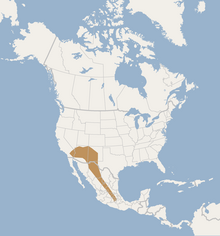| Arizona myotis | |
|---|---|
| Scientific classification | |
| Domain: | Eukaryota |
| Kingdom: | Animalia |
| Phylum: | Chordata |
| Class: | Mammalia |
| Order: | Chiroptera |
| Family: | Vespertilionidae |
| Genus: | Myotis |
| Species: | M. occultus
|
| Binomial name | |
| Myotis occultus Hollister, 1909
| |

| |
The Arizona myotis (Myotis occultus) or southwestern little brown myotis[2] is a vesper bat species inhabiting much of the southwestern United States and central Mexico as far south as the Distrito Federal.[1]
Taxonomy and etymology
It was described as a new species in 1909 by American zoologist Ned Hollister. The holotype was collected near Needles, California, in 1905.[3] Its specific name "occultus" is Latin for "hidden or concealed".
Description
It is a small species with a total length of 96 mm (3.8 in)— of the total length, 40 mm (1.6 in) consists of its tail. Its fur is glossy brown with a cinnamon tint. The ventral fur and its face are paler brown.[3]
Range and habitat
Its range includes parts of the Southwestern United States and the Mexican state of Chihuahua. It is found in a range of elevations from near sea level to 2,806 m (9,206 ft) above sea level.[1]
Conservation
As of 2018, it is evaluated as a least-concern species by the IUCN. It meets the criteria for this classification because it has a wide geographic range, its range includes protected areas, and it is not likely experiencing rapid population decline.[1]
References
- ^ a b c d Solari, S. (2018). "Myotis occultus". The IUCN Red List of Threatened Species. 2018: e.T136650A21990499. doi:10.2305/IUCN.UK.2018-2.RLTS.T136650A21990499.en.
- ^ "Mammals of Texas". Natural Science Research Laboratory. Texas Tech University. Retrieved 17 October 2023.
- ^ a b Hollister, N. (1909). "Two new bats from the southwestern United States". Proceedings of the Biological Society of Washington. 22: 43–44.









